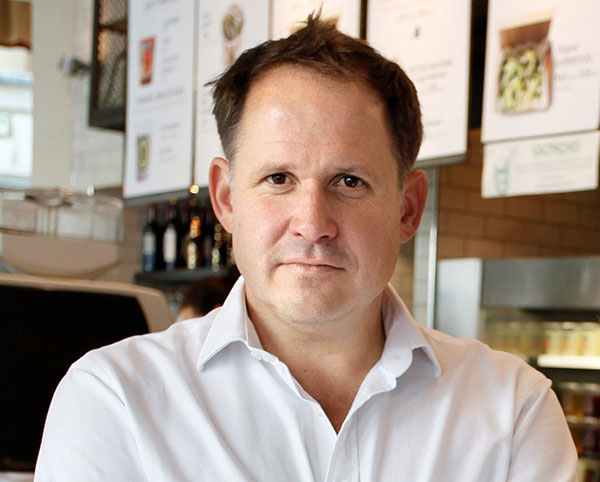Since World War II, there hasn’t been an official full-scale evaluation of the UK’s national food system, even despite its failings.
That is, until now. In June 2019, then environment secretary Michael Gove asked Henry Dimbleby to lead the National Food Strategy and an independent review of Britain’s food system from head to toe, set to publish in the coming Spring. Its aims? To inform the government on how to create a sustainable, environmentally friendly, resilient, affordable, and healthy system for the future.
Dimbleby seems like a good choice to lead such an inquiry. As co-founder of healthy fast food chain Leon, he has a solid grasp on distribution networks, what food is benign but also accessible, and why the food economy’s shortcomings – or as he tells me “things that are obviously stupid” – occur. He also previously advised parliament on improving food in schools, is a director of street food market London Union, a former chef, and home cook.

Better still, he has the brain of a sponge – during our conversation it’s evident he’s collected a range of information from hard research, meetings with business owners, farm visits, and ordinary citizens who the current food policy has failed. Dimbleby thinks it all started to go wrong with the Green Revolution, the 1950s-60s movement of industrialising agriculture to meet soaring demand.
“We were not going to have enough food to eat,” he says. “And through the Green Revolution we managed to avoid global starvation. As a consequence of creating more calories per hectare, we drove out biodiversity. And as the food supply increased, we became fatter and became sick.
“That second problem was made worse because we evolved not in a world of calorie denseness, but it’s those foods that make cheap carbs, refined vegetable fats, and sugar. And those things are easy to market. So it’s no surprise there are 28 versions of KitKat, because they’re easier to sell than runner beans.”
Those who’ve been blamed for helping propagate a culture of high-sugar high-calorie diets form part of Dimbleby’s advisory panel, a group of food industry leaders from each ends of the spectrum – from the general manager of Unilever to the chief executive of the Soil Association – and as much as possible in-between. While some of these names may seem responsible for some of the issues Dimbleby is trying to correct, he doesn’t want to demonise supermarket chains or food processors.

“Is there a problem with the economics incentivising companies to do things that make us sick? Yes there is,” says Dimbleby. “Are there people whose intention it is to make that happen? No. So our task is: how do we resolve that? You have to involve everyone who’s in the food system if you want to change it.”
Dimbleby’s all-encompassing approach has yielded some surprising findings. “What’s really striking,” he says, “is that wherever you go, whether it’s a tiny organic dairy in Lincolnshire, or a large arable farm in Hampshire, everyone is thinking about an agro-ecological approach. Farmers who use pesticides, even organic farmers, are thinking how they can reduce inputs and increase the fertility of the soil.”
At the moment, smaller farmers and businesses may be more willing to adopt ethical and sustainable practices, but the marketplace doesn’t reward them in the same way it does those relying on economies of scale. Will smaller local food producers get the helping hand they need?
“It’s more than a case of local good not local bad,” Dimbleby says. “There are obvious examples like small abattoirs, where it is clear there’s a market failure harmful to the system more broadly. It has become increasingly hard for small local abattoirs to operate, and they’ve been going out of business at a fast rate.
“The impact of that has been twofold: livestock having to be transported further, adding to stress of the animals, but the second more complicated one is that – as a lot of conventional farmers have described to me – if we are going to bring livestock into rotations to improve the soil, that could be tricky if you don’t have local abattoirs.”

Meat is an obviously crucial topic within British food, and agriculture’s potential to stem its release of greenhouse emissions will make an important part of the review. The trouble is, Dimbleby says, that the quality of the discussion needs to improve first.
“If you were to stop methane overnight, that methane would fall out of the atmosphere and could contribute to a cooling effect. That is why the issue is so potent, but in this country what it doesn’t take into account is massively different forms of beef production.
“If you’re looking at a small amount of livestock in an agro-ecological rotation to build fertility in the soil, that is completely different to livestock fed on soy. Meat needs a more nuanced debate. Which is something we’re going to be trying to do.”
If there was one way to define Dimbleby and his team’s approach to Britain’s most important food review in 75 years, it would involve one word. “What crops, what infrastructure, what do we want to eat?” says Dimbleby. “It will all come down to questions of diversity.”
Spring is the season of hope, rebirth, and regeneration. Perhaps it’s fitting, then, that Dimbleby will publish his first findings in the next couple of months and potentially shape the future of our food system.









It looks promising, let’s hope the big food companies don’t dominate
Excellent balanced article – thank you